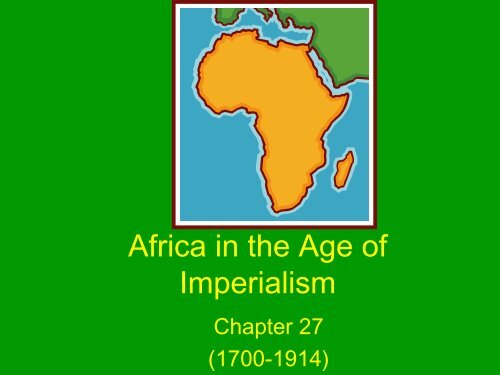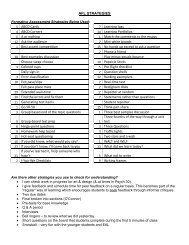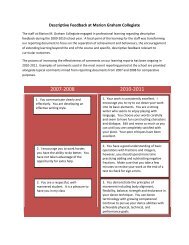Africa in the Age of Imperialism - Saskatoon Public Schools
Africa in the Age of Imperialism - Saskatoon Public Schools
Africa in the Age of Imperialism - Saskatoon Public Schools
Create successful ePaper yourself
Turn your PDF publications into a flip-book with our unique Google optimized e-Paper software.
<strong>Africa</strong> <strong>in</strong> <strong>the</strong> <strong>Age</strong> <strong>of</strong><br />
<strong>Imperialism</strong><br />
Chapter 27<br />
(1700-1914)
• Dur<strong>in</strong>g <strong>the</strong> <strong>Age</strong> <strong>of</strong> Exploration, Europeans built a few trad<strong>in</strong>g<br />
posts on <strong>the</strong> coast <strong>of</strong> <strong>Africa</strong>, but for centuries <strong>the</strong>y had little<br />
direct <strong>in</strong>fluence on <strong>the</strong> lives <strong>of</strong> most <strong>Africa</strong>ns.<br />
• In <strong>the</strong> 1800s, a dramatic change occurred. The Industrial<br />
Revolution and <strong>the</strong> growth <strong>of</strong> nationalism streng<strong>the</strong>ned<br />
European nations.<br />
• In <strong>the</strong> 1870s, <strong>the</strong>y were seek<strong>in</strong>g new resources and markets.<br />
They found <strong>the</strong>se resources and outlets <strong>in</strong> many parts <strong>of</strong> <strong>the</strong><br />
world, <strong>in</strong>clud<strong>in</strong>g <strong>Africa</strong>.
A New Era <strong>of</strong> European Expansion -<br />
Scramble for <strong>Africa</strong><br />
• Between 1870 and 1914, a<br />
dramatic change occurred.<br />
• With <strong>the</strong> exception <strong>of</strong> Liberia<br />
and Ethiopia, <strong>the</strong> entire <strong>Africa</strong>n<br />
cont<strong>in</strong>ent came under European<br />
rule.<br />
• Belgium acquired <strong>the</strong> Congo,<br />
today called Zaire.<br />
• Then, <strong>the</strong> French moved to <strong>the</strong><br />
<strong>in</strong>terior <strong>of</strong> West <strong>Africa</strong>, and <strong>the</strong><br />
British extended <strong>the</strong>ir control<br />
across much <strong>of</strong> <strong>the</strong> cont<strong>in</strong>ent.<br />
• Germany, Spa<strong>in</strong>, Portugal, and<br />
Italy also entered <strong>the</strong> race for<br />
<strong>Africa</strong>n territory.
• The “scramble for <strong>Africa</strong>” brought European powers to <strong>the</strong><br />
br<strong>in</strong>k <strong>of</strong> war. To settle <strong>the</strong>ir disagreements, <strong>the</strong>y held a<br />
conference <strong>in</strong> Berl<strong>in</strong>.<br />
• At <strong>the</strong> Berl<strong>in</strong> Conference <strong>of</strong> 1884-1885, <strong>the</strong>se European<br />
nations drew boundary l<strong>in</strong>es on a map <strong>of</strong> <strong>Africa</strong>, divid<strong>in</strong>g<br />
up <strong>the</strong> cont<strong>in</strong>ent and approv<strong>in</strong>g each o<strong>the</strong>r’s claims to<br />
different <strong>Africa</strong>n lands. They <strong>the</strong>n proceeded to establish<br />
control over <strong>the</strong>se regions.
European <strong>in</strong>fluence <strong>in</strong><br />
<strong>Africa</strong> <strong>in</strong> 1850<br />
European <strong>in</strong>fluence <strong>in</strong> <strong>Africa</strong> <strong>in</strong><br />
1884-1885
The <strong>Age</strong> <strong>of</strong> <strong>Imperialism</strong><br />
• <strong>Imperialism</strong> is <strong>the</strong> dom<strong>in</strong>ation by a country <strong>of</strong> <strong>the</strong><br />
political, economic, or cultural life <strong>of</strong> ano<strong>the</strong>r<br />
country or region.<br />
• A colony is a possession that <strong>the</strong> imperial power<br />
controls directly.<br />
• A sphere <strong>of</strong> <strong>in</strong>fluence is a region <strong>in</strong> which <strong>the</strong><br />
imperial power claims exclusive <strong>in</strong>vestment or<br />
trad<strong>in</strong>g privileges.<br />
• A protectorate is a country that has its own<br />
government but whose policies are guided by <strong>the</strong><br />
imperial power.
European Expansion<br />
• Nationalism played a major role <strong>in</strong> send<strong>in</strong>g Europeans<br />
overseas. A nation <strong>in</strong>creased its prestige and power by<br />
w<strong>in</strong>n<strong>in</strong>g an overseas empire.<br />
• Political rivalries and military strategy also<br />
contributed to imperialism. One nation might seize a<br />
territory to prevent a rival from expand<strong>in</strong>g <strong>in</strong>to that region.<br />
• The desire to expand economically was also a<br />
strong motive. Industrialists urged <strong>the</strong>ir<br />
governments to acquire new markets for <strong>the</strong>ir<br />
products. In addition, <strong>the</strong>y wanted to control<br />
<strong>the</strong> supply <strong>of</strong> raw material.
• Humanitarian and religious concerns <strong>of</strong>ten<br />
motivated <strong>in</strong>dividuals and <strong>the</strong>ir governments.<br />
Some Europeans wanted to end <strong>the</strong> slave trade<br />
<strong>in</strong> <strong>Africa</strong>.<br />
•`<br />
An <strong>Africa</strong>n tribe captures and enslaves<br />
ano<strong>the</strong>r. Slavery existed <strong>in</strong> <strong>Africa</strong> for<br />
thousands <strong>of</strong> years <strong>in</strong>dependent <strong>of</strong> any<br />
European <strong>in</strong>volvement, yet <strong>the</strong> image <strong>of</strong><br />
slavery today is one <strong>of</strong> Whites enslav<strong>in</strong>g<br />
Blacks.
• Christian missionaries were conv<strong>in</strong>ced that<br />
<strong>the</strong> peoples <strong>of</strong> <strong>Africa</strong> and Asia would<br />
become “civilized” only if <strong>the</strong>y converted<br />
to Christianity and adopted European<br />
ways.<br />
• Many Europeans believed <strong>in</strong> superiority<br />
<strong>of</strong> <strong>the</strong> white race. They spoke <strong>of</strong> “<strong>the</strong><br />
white man’s burden” <strong>of</strong> carry<strong>in</strong>g <strong>the</strong><br />
benefits <strong>of</strong> western civilization to o<strong>the</strong>r<br />
parts <strong>of</strong> <strong>the</strong> world.
Explor<strong>in</strong>g <strong>the</strong> Interior<br />
• David Liv<strong>in</strong>gstone (1813-1873) – a British physician and<br />
missionary – spent many years sett<strong>in</strong>g up Christian missions<br />
<strong>in</strong> Central <strong>Africa</strong>. His reports made <strong>the</strong> British public aware<br />
<strong>of</strong> opportunities <strong>in</strong> <strong>Africa</strong> for bus<strong>in</strong>ess people as well as<br />
missionaries.<br />
• George Goldie (1846-1925)<br />
charted <strong>the</strong> Niger River.<br />
Henry Stanley (1841-1904) trekked<br />
<strong>in</strong>land from <strong>the</strong> East <strong>Africa</strong>n coast to<br />
discover <strong>the</strong> source <strong>of</strong> <strong>the</strong> Congo River.
New Technology<br />
• Despite <strong>the</strong> expeditions <strong>in</strong>to <strong>the</strong> <strong>Africa</strong>n <strong>in</strong>terior, disease<br />
and resistance by <strong>Africa</strong>ns prevented much European<br />
expansion beyond <strong>the</strong> coastal areas before 1870.<br />
• As European <strong>in</strong>terest <strong>in</strong> <strong>Africa</strong> grew, doctors<br />
searched for <strong>the</strong> causes and treatment <strong>of</strong><br />
diseases such as malaria and yellow fever,<br />
which claimed many European lives <strong>in</strong> <strong>Africa</strong>.<br />
By <strong>the</strong> 1880s, <strong>the</strong>y had learned that<br />
mosquitoes carried malaria & yellow fever.<br />
• They found that qu<strong>in</strong><strong>in</strong>e, made from <strong>the</strong><br />
bark <strong>of</strong> a certa<strong>in</strong> tree, prevented people<br />
from catch<strong>in</strong>g malaria. Such medical<br />
discoveries made it easier for Europeans<br />
to move <strong>in</strong>to <strong>the</strong> <strong>in</strong>terior <strong>of</strong> <strong>Africa</strong>.
New Technology<br />
• The development <strong>of</strong> new weapons gave Europeans a<br />
military advantage over <strong>Africa</strong>ns.<br />
• These weapons <strong>in</strong>cluded rifles and <strong>the</strong> Maxim gun,<br />
<strong>the</strong> earliest mach<strong>in</strong>e gun.<br />
• <strong>Africa</strong>ns armed with weapons such as muskets had<br />
little success aga<strong>in</strong>st Europeans us<strong>in</strong>g <strong>the</strong> new<br />
weapons.<br />
Musket<br />
Rifle<br />
Maxim gun
Section Review<br />
• Patterns <strong>of</strong> Civilization<br />
• P.491 – #3-5
North <strong>Africa</strong> –<br />
The Egyptian Empire<br />
• When Napoleon <strong>in</strong>vaded Egypt <strong>in</strong> 1798,<br />
Egyptians broke away from Ottoman<br />
rule. The French <strong>in</strong>vasion sparked a<br />
long civil war.<br />
• Muhammed Ali Pasha (1769-1849),<br />
who had led Egyptian resistance to <strong>the</strong><br />
French <strong>in</strong>vasion, seized control <strong>of</strong> <strong>the</strong><br />
country <strong>in</strong> 1805.
• Ali ruthlessly suppressed his<br />
opponents and embarked on an<br />
ambitious program <strong>of</strong> reform to<br />
make Egypt a strong power.<br />
• He began by <strong>in</strong>troduc<strong>in</strong>g more efficient<br />
agricultural techniques. He had dykes<br />
and irrigation canals built so that<br />
arid land could be cultivated.<br />
• He <strong>the</strong>n sent peasant farmers to grow<br />
cash crops on <strong>the</strong> new lands.<br />
Irrigation Canal
• Cash crops are crops such as cotton, sugar, and<br />
tobacco that can be sold for money on <strong>the</strong> world<br />
market.<br />
Cotton Sugar cane Tobacco<br />
• Egypt soon became a major exporter <strong>of</strong> cotton to<br />
<strong>in</strong>dustrial nations such as Great Brita<strong>in</strong>.
• Income from cash crops helped pay for Ali’s o<strong>the</strong>r<br />
projects.<br />
• He established schools and sent thousands <strong>of</strong><br />
Egyptians to study <strong>in</strong> Europe.<br />
• He brought European experts<br />
to Egypt to help set up textile<br />
mills, iron works, and<br />
shipyards.
• He also <strong>in</strong>vited French military <strong>of</strong>ficers to reorganize,<br />
tra<strong>in</strong>, and equip <strong>the</strong> Egyptian army.<br />
• With a strong modern army to support him, Ali built an<br />
empire.<br />
• Dur<strong>in</strong>g <strong>the</strong> 1820s and 1830s,<br />
Egyptian armies seized territory<br />
along <strong>the</strong> Red Sea coast and<br />
moved up <strong>the</strong> Nile River <strong>in</strong>to <strong>the</strong><br />
Sudan.
Grow<strong>in</strong>g European Interest<br />
<strong>in</strong> Egypt<br />
• Ali’s programs were expensive. To f<strong>in</strong>ance<br />
<strong>the</strong>m, he borrowed money from European<br />
banks. Under Ali’s successors, Egyptian debts<br />
<strong>in</strong>creased.<br />
• Gradually, European creditors ga<strong>in</strong>ed political<br />
and economic <strong>in</strong>fluence <strong>in</strong> Egypt. They<br />
pressured Egyptian leaders to follow policies<br />
that favoured <strong>the</strong>ir f<strong>in</strong>ancial <strong>in</strong>terests.
The Suez Canal<br />
• Europeans had relatively little <strong>in</strong>terest <strong>in</strong><br />
Egypt until 1859, when <strong>the</strong> French began<br />
build<strong>in</strong>g <strong>the</strong> Suez Canal.<br />
• Ali had opposed construction <strong>of</strong> a canal to<br />
l<strong>in</strong>k <strong>the</strong> Mediterranean Sea and <strong>the</strong> Red Sea.<br />
• He feared that such a canal would <strong>in</strong>crease<br />
European <strong>in</strong>terest <strong>in</strong> Egypt because it would<br />
cut thousands <strong>of</strong> miles <strong>of</strong>f <strong>the</strong> trip from<br />
Europe to Asia. However, his successors<br />
approved <strong>the</strong> project.
The Suez Canal<br />
Ferd<strong>in</strong>and de Lesseps (1805-1894)<br />
• Between 1859 and 1869, a<br />
French company headed by<br />
Ferd<strong>in</strong>and de Lesseps built<br />
<strong>the</strong> Suez Canal.<br />
• At first, Egyptians<br />
controlled <strong>the</strong> canal. But as<br />
British <strong>in</strong>fluence <strong>in</strong> India<br />
grew, Brita<strong>in</strong> came to see<br />
<strong>the</strong> Suez Canal as <strong>the</strong><br />
“lifel<strong>in</strong>e <strong>of</strong> <strong>the</strong> British<br />
Empire.”
British Occupation <strong>of</strong><br />
Egypt<br />
• In <strong>the</strong> 1870s, Brita<strong>in</strong> acquired partial control<br />
over <strong>the</strong> Suez Canal by buy<strong>in</strong>g shares <strong>of</strong> stock<br />
from Egyptian ruler Ismail Pacha (1830-1895).<br />
Ismail sold <strong>the</strong> stock because <strong>the</strong> Egyptian<br />
government faced a severe f<strong>in</strong>ancial crisis.<br />
• The chaotic state <strong>of</strong> Egyptian f<strong>in</strong>ances eventually<br />
provided <strong>the</strong> British with an excuse to <strong>in</strong>tervene<br />
militarily <strong>in</strong> Egypt.<br />
• Claim<strong>in</strong>g that it wanted to protect European loans<br />
and <strong>in</strong>vestments and reorganize <strong>the</strong> Egyptian<br />
treasury, Brita<strong>in</strong> sent troops to occupy Egypt <strong>in</strong><br />
1882. The British <strong>the</strong>n made Egypt a<br />
protectorate.
• Under British control, Egypt paid <strong>of</strong>f its foreign<br />
debts and built a dam at Aswan on <strong>the</strong> upper Nile.<br />
• However, Egyptian<br />
nationalists resented foreign<br />
control. They criticized <strong>the</strong><br />
British for not encourag<strong>in</strong>g<br />
education or help<strong>in</strong>g<br />
Egyptian <strong>in</strong>dustries.<br />
The dam improved<br />
agricultural production by<br />
supply<strong>in</strong>g water for irrigation.
Territorial Divides<br />
• British occupation <strong>of</strong> Egypt led<br />
to an explosive confrontation<br />
with France.<br />
• The British thought <strong>the</strong>ir control<br />
<strong>of</strong> Egypt and <strong>the</strong> Suez Canal<br />
would only be assured if <strong>the</strong>y<br />
also possessed <strong>the</strong> headwaters <strong>of</strong><br />
<strong>the</strong> Nile <strong>in</strong> <strong>the</strong> Sudan. For 16<br />
years, Sudanese nationalists<br />
resisted attempts to occupy <strong>the</strong>ir<br />
land.<br />
• F<strong>in</strong>ally, <strong>in</strong> 1898, a comb<strong>in</strong>ed<br />
force <strong>of</strong> British and Egyptians<br />
conquered <strong>the</strong> Sudan.<br />
Meanwhile, a French army had<br />
reached <strong>the</strong> Sudan from bases <strong>in</strong><br />
West <strong>Africa</strong>.
The Fashoda Incident<br />
• British and French forces faced each<br />
o<strong>the</strong>r at Fashoda (today known as<br />
Kodok). For weeks, <strong>the</strong> two European<br />
powers seemed on <strong>the</strong> br<strong>in</strong>k <strong>of</strong> war.<br />
• In <strong>the</strong> end, <strong>the</strong> domestic crisis over <strong>the</strong><br />
Dreyfus Affair (see next slide) forced <strong>the</strong><br />
French to withdraw.<br />
• Brita<strong>in</strong> and Egypt <strong>the</strong>n established jo<strong>in</strong>t<br />
control over Sudan. The Fashoda<br />
<strong>in</strong>cident rem<strong>in</strong>ded Europeans <strong>of</strong> <strong>the</strong><br />
very real possibility that overseas<br />
rivalries could drag <strong>the</strong>m <strong>in</strong>to war.<br />
Kodok, formerly<br />
Fashoda, lies on <strong>the</strong><br />
banks <strong>of</strong> <strong>the</strong> White Nile.<br />
Shown here with<strong>in</strong> <strong>the</strong><br />
modern day borders <strong>of</strong><br />
Sudan.
The ‘Dreyfus Affaire’<br />
• In 1894, Capta<strong>in</strong> Alfred Dreyfus (1859-1935), an<br />
<strong>of</strong>ficer on <strong>the</strong> French general staff, is accused <strong>of</strong><br />
spy<strong>in</strong>g for Germany, France's opponent <strong>in</strong> <strong>the</strong> last<br />
war. The only evidence is a scrap <strong>of</strong> paper,<br />
retrieved from <strong>the</strong> wastebasket by a clean<strong>in</strong>g<br />
woman, with handwrit<strong>in</strong>g that does not much<br />
resemble that <strong>of</strong> Dreyfus. But Dreyfus is Jewish,<br />
<strong>the</strong> only Jew on <strong>the</strong> general staff. And Jews are<br />
considered people without a fa<strong>the</strong>rland,<br />
<strong>in</strong>sufficiently loyal to <strong>the</strong> country <strong>the</strong>y live <strong>in</strong>.<br />
• Dreyfus is convicted, partly on evidence forged by<br />
anti-Semitic <strong>of</strong>ficers, and sentenced to life<br />
imprisonment on Devil's Island <strong>of</strong>f <strong>the</strong> coast <strong>of</strong><br />
South America.<br />
The Dreyfus Affair sent France<br />
<strong>in</strong>to yet ano<strong>the</strong>r crisis. Writers<br />
everywhere began to speak out<br />
aga<strong>in</strong>st <strong>the</strong> wrongful<br />
conviction <strong>of</strong> <strong>the</strong> Jewish<br />
capta<strong>in</strong> and divided France<br />
<strong>in</strong>to two political camps:<br />
Dreyfusards and Anti-<br />
Dreyfusards.
Algeria<br />
• The French government encouraged Europeans to<br />
settle <strong>in</strong> Algeria.<br />
• Colonists took lands, especially<br />
along <strong>the</strong> fertile Mediterranean<br />
coast, and established successful<br />
farm<strong>in</strong>g and bus<strong>in</strong>ess<br />
communities.<br />
• In all, almost 1 million Europeans<br />
settled <strong>in</strong> Algeria dur<strong>in</strong>g <strong>the</strong> 1800s.<br />
The Sahara Desert dom<strong>in</strong>ates<br />
~80% <strong>of</strong> <strong>the</strong> nation
• France took little<br />
<strong>in</strong>terest <strong>in</strong> o<strong>the</strong>r North<br />
<strong>Africa</strong>n lands until <strong>the</strong><br />
1880s.<br />
• Then as Brita<strong>in</strong> moved<br />
<strong>in</strong>to Egypt, <strong>the</strong> French<br />
rapidly occupied<br />
Tunisia.<br />
• French expansion<br />
along <strong>the</strong><br />
Mediterranean<br />
worried <strong>the</strong> Italians,<br />
whose <strong>in</strong>terest <strong>in</strong><br />
North <strong>Africa</strong> was<br />
grow<strong>in</strong>g.<br />
Tunisia
Ethiopia<br />
• Both France and Italy sought control <strong>of</strong> <strong>the</strong> horn<br />
<strong>of</strong> <strong>Africa</strong>, present day Somalia and Ethiopia.<br />
• Aware <strong>of</strong> <strong>the</strong> European<br />
threat, <strong>the</strong> Ethiopian<br />
emperor Menelik II<br />
bought rifles and o<strong>the</strong>r<br />
new weapons and tra<strong>in</strong>ed<br />
his army to use <strong>the</strong>m.<br />
• Thus, when <strong>the</strong> Italians<br />
<strong>in</strong>vaded Ethiopia <strong>in</strong> 1896,<br />
<strong>the</strong>y were defeated by<br />
strong, well-armed<br />
Ethiopian forces.<br />
Emperor Menelik II (also<br />
known as Sahle Maryam<br />
<strong>of</strong> Shewa) (1844-1913)
• Italy had to be content with<br />
establish<strong>in</strong>g protectorates<br />
over Eritrea and part <strong>of</strong><br />
Somaliland. In 1912, <strong>the</strong><br />
Italians occupied Tripoli,<br />
which <strong>the</strong>y set up as <strong>the</strong><br />
colony <strong>of</strong> Libya, <strong>the</strong><br />
Italians prevented fur<strong>the</strong>r<br />
French expansion eastward<br />
across North <strong>Africa</strong>.<br />
Libya
• Morocco, at <strong>the</strong><br />
north-western tip<br />
<strong>of</strong> <strong>Africa</strong>,<br />
rema<strong>in</strong>ed largely<br />
outside European<br />
control until <strong>the</strong><br />
1880s. Learn<strong>in</strong>g<br />
from <strong>the</strong> Egyptian<br />
example, <strong>the</strong><br />
Moroccan ruler<br />
avoided build<strong>in</strong>g<br />
up large debts <strong>in</strong><br />
Europe.<br />
Crisis Over Morocco<br />
• For years, Brita<strong>in</strong><br />
and France had<br />
quarrelled over<br />
Egypt. In 1904,<br />
<strong>the</strong>y f<strong>in</strong>ally<br />
reached an<br />
agreement. France<br />
would recognize<br />
British <strong>in</strong>terests <strong>in</strong><br />
Egypt, and Brita<strong>in</strong><br />
would let France<br />
establish a sphere<br />
<strong>of</strong> <strong>in</strong>fluence <strong>in</strong><br />
Morocco and not<br />
protest any French<br />
efforts to take over<br />
Morocco directly.
Section Review<br />
• Patterns <strong>of</strong> Civilization<br />
• P. 495 - #4-6
The Transatlantic Slave Trade<br />
• Slavery had existed <strong>in</strong> <strong>Africa</strong> s<strong>in</strong>ce ancient times, as it had <strong>in</strong><br />
many parts <strong>of</strong> <strong>the</strong> world. In <strong>Africa</strong>, many slaves were captives<br />
taken <strong>in</strong> war. O<strong>the</strong>rs were people who sold <strong>the</strong>mselves <strong>in</strong>to<br />
slavery for food and shelter dur<strong>in</strong>g drought or fam<strong>in</strong>e.<br />
Sometimes, a society took slaves <strong>in</strong> order to <strong>in</strong>crease its<br />
population. Slaves were <strong>of</strong>ten gradually absorbed <strong>in</strong>to <strong>the</strong>ir<br />
new societies.
• The transatlantic slave trade was very different from<br />
<strong>Africa</strong>n slavery. <strong>Africa</strong>ns were forced to leave <strong>the</strong>ir<br />
traditional societies and were transported thousands<br />
<strong>of</strong> miles across <strong>the</strong> Atlantic. In <strong>the</strong> Americas, <strong>the</strong>y<br />
encountered a completely unfamiliar culture. White<br />
slave owners looked on black <strong>Africa</strong>ns as <strong>in</strong>ferior<br />
be<strong>in</strong>gs whose only value was <strong>the</strong>ir labour.
• The transatlantic slave trade <strong>in</strong>volved large<br />
numbers <strong>of</strong> people. Experts now estimate that<br />
between 1451 and 1870 about 9.5 million<br />
slaves were sent to <strong>the</strong> Americas. Thousands<br />
died dur<strong>in</strong>g <strong>the</strong> brutal Middle Passage.<br />
Artwork depict<strong>in</strong>g <strong>the</strong> cramped conditions<br />
and brutality endured by <strong>the</strong> <strong>Africa</strong>n slaves.
• Europeans relied on<br />
<strong>Africa</strong>n rulers and<br />
merchants to br<strong>in</strong>g slaves<br />
to trad<strong>in</strong>g posts on <strong>the</strong><br />
coast. The <strong>Africa</strong>ns<br />
exchanged slaves for guns,<br />
ammunition, and<br />
manufactured goods.<br />
They used <strong>the</strong> guns to raid<br />
villages and capture more<br />
slaves. This exchange<br />
between <strong>Africa</strong>ns and<br />
Europeans has <strong>of</strong>ten been<br />
called <strong>the</strong> slave-gun cycle.
A Century <strong>of</strong> Change<br />
• In <strong>the</strong> century before 1870, two developments<br />
changed conditions <strong>in</strong> West <strong>Africa</strong>. First, European<br />
nations abolished <strong>the</strong> slave trade. Second, <strong>the</strong>re was a<br />
revival <strong>of</strong> Islam <strong>in</strong> several West <strong>Africa</strong>n states.
Abolition <strong>of</strong> <strong>the</strong> slave trade<br />
• Dur<strong>in</strong>g <strong>the</strong> Enlightenment, some Europeans called for<br />
an end to <strong>the</strong> slave trade and slavery. By <strong>the</strong> early<br />
1800s, this humanitarian concern was hav<strong>in</strong>g an<br />
effect. Brita<strong>in</strong> outlawed <strong>the</strong> slave trade <strong>in</strong> 1807.<br />
Brita<strong>in</strong> also conv<strong>in</strong>ced o<strong>the</strong>r nations at <strong>the</strong> Congress<br />
<strong>of</strong> Vienna to condemn <strong>the</strong> slave trade. But Portugal,<br />
Spa<strong>in</strong>, and France did not end <strong>the</strong>ir slave trade until<br />
1820.
• Soon after Brita<strong>in</strong> abolished <strong>the</strong> slave trade, it established <strong>the</strong><br />
West <strong>Africa</strong>n Patrol, a naval force with orders to prevent slave<br />
ships from leav<strong>in</strong>g West <strong>Africa</strong>n ports. When <strong>the</strong> patrol<br />
captured ships with slaves on board, it carried <strong>the</strong> <strong>Africa</strong>ns to<br />
Freetown <strong>in</strong> <strong>the</strong> British colony <strong>of</strong> Sierra Leone. The British<br />
had established Freetown <strong>in</strong> <strong>the</strong> late 1700s for slaves <strong>the</strong>y<br />
freed dur<strong>in</strong>g <strong>the</strong> American Revolution. In <strong>the</strong> 1800s, Sierra<br />
Leone became a haven for o<strong>the</strong>r freed slaves. Christian<br />
missionaries worked among <strong>the</strong> <strong>Africa</strong>n settlers <strong>the</strong>re,<br />
encourag<strong>in</strong>g <strong>the</strong>m to adopt European Ways.
• In 1822, a group <strong>of</strong> free<br />
black Americans established<br />
ano<strong>the</strong>r refuge for former<br />
slaves <strong>in</strong> West <strong>Africa</strong>. The<br />
new settlement was called<br />
Liberia. In <strong>the</strong> 1830s and<br />
1840s, hundreds <strong>of</strong> former<br />
slaves <strong>in</strong> <strong>the</strong> United States<br />
emigrated to Liberia. By<br />
1850, Liberia had become an<br />
<strong>in</strong>dependent nation.<br />
Liberia
Revival <strong>of</strong> Islam<br />
• The most important<br />
development <strong>in</strong> West <strong>Africa</strong><br />
dur<strong>in</strong>g this period was <strong>the</strong><br />
revival <strong>of</strong> Islam.<br />
• Most people <strong>in</strong> West <strong>Africa</strong><br />
ei<strong>the</strong>r cont<strong>in</strong>ued to believe <strong>in</strong><br />
<strong>the</strong>ir traditional religions or<br />
mixed Muslim beliefs with<br />
<strong>the</strong>ir own faiths. Devout<br />
Muslims detested <strong>the</strong> mix<strong>in</strong>g<br />
<strong>of</strong> Islam with o<strong>the</strong>r faiths.
Nigeria<br />
• In <strong>the</strong> early 1800s, Muslim religious leaders<br />
called for a jihad, or holy war, to restore <strong>the</strong><br />
purity <strong>of</strong> Islam. Muslims believe that a Muslim<br />
killed <strong>in</strong> a jihad is assured a place <strong>in</strong> heaven.<br />
With armies <strong>in</strong>spired by this belief, several<br />
Islamic states <strong>in</strong> West <strong>Africa</strong> conquered large<br />
empires.<br />
• Among <strong>the</strong> best known <strong>of</strong> <strong>the</strong>se Islamic empires<br />
was <strong>the</strong> Hausa-Fulani Empire located <strong>in</strong> what is<br />
today nor<strong>the</strong>rn Nigeria. In 1804, Usuman dan<br />
Fodio (1754–1817), a Muslim scholar, unified<br />
<strong>the</strong> nomadic Fulani people. The next year, he<br />
led <strong>the</strong>m <strong>in</strong> a jihad aga<strong>in</strong>st <strong>the</strong> Hausa people<br />
because he thought <strong>the</strong> Hausa had corrupted<br />
Muslim practices. Usuman’s forces seized<br />
control <strong>of</strong> <strong>the</strong> Hausa cities. Usuman <strong>the</strong>n<br />
organized <strong>the</strong> new lands <strong>in</strong>to strong Islamic<br />
state.
Flag <strong>of</strong> <strong>the</strong><br />
Congo Free State<br />
European Conquests<br />
• The scramble for colonies began <strong>in</strong><br />
<strong>the</strong> 1870s when Belgium concluded<br />
treaties with <strong>Africa</strong>n rulers along<br />
<strong>the</strong> Congo River. Henry Stanley<br />
(1841-1904) explored <strong>the</strong> Congo<br />
River bas<strong>in</strong>. He also negotiated<br />
treaties with local rulers for <strong>the</strong><br />
right to exploit <strong>the</strong> m<strong>in</strong>eral wealth<br />
<strong>of</strong> <strong>the</strong> region. Stanley hoped that<br />
Brita<strong>in</strong> would send settlers to <strong>the</strong><br />
Congo, but Brita<strong>in</strong> was not<br />
<strong>in</strong>terested.<br />
• Thus, Stanley turned to K<strong>in</strong>g<br />
Leopold II (1835-1909) <strong>of</strong><br />
Belgium, who agreed to set up<br />
Belgian settlements <strong>the</strong>re. Belgium<br />
<strong>the</strong>reby ga<strong>in</strong>ed control <strong>of</strong> <strong>the</strong><br />
region, which became known as <strong>the</strong><br />
Congo Free State.
• The brutal treatment <strong>of</strong> <strong>the</strong> local<br />
people <strong>in</strong> <strong>the</strong> Congo Free State has<br />
come to symbolize <strong>the</strong> worst aspects<br />
<strong>of</strong> European imperialism <strong>in</strong> <strong>Africa</strong>.<br />
K<strong>in</strong>g Leopold II ruled <strong>the</strong> Congo<br />
Free State as his own private<br />
possession. The area was rich <strong>in</strong><br />
rubber and copper and <strong>the</strong> o<strong>the</strong>r<br />
m<strong>in</strong>erals. Leopold granted<br />
monopolies to European companies<br />
and earned handsome pr<strong>of</strong>its for<br />
himself.<br />
Copper Rubber
• The European companies ruthlessly exploited both<br />
<strong>the</strong> land and <strong>the</strong> people <strong>in</strong> <strong>the</strong> Congo Free State. To<br />
ensure maximum pr<strong>of</strong>it, company managers forced<br />
<strong>Africa</strong>ns to work long hours and punished <strong>the</strong>m<br />
brutally if <strong>the</strong>y did not produce enough. They also<br />
imprisoned <strong>Africa</strong>n women to make <strong>the</strong>ir husbands<br />
work harder. Workers had <strong>the</strong>ir hands or ears cut <strong>of</strong>f<br />
if <strong>the</strong>y protested.
• When Christian missionaries <strong>in</strong> <strong>the</strong> Congo<br />
revealed <strong>the</strong>se atrocities (crimes), <strong>the</strong> Belgian<br />
government began an <strong>in</strong>vestigation.<br />
Eventually, <strong>in</strong> 1908, <strong>the</strong> government took over<br />
<strong>the</strong> adm<strong>in</strong>istration <strong>of</strong> <strong>the</strong> Congo Free State,<br />
which <strong>the</strong>n became known as <strong>the</strong> Belgian<br />
Congo.
Ghana<br />
• In 1879, <strong>the</strong> French built a<br />
railroad from Dakar, on <strong>the</strong> coast,<br />
<strong>in</strong>to <strong>the</strong> <strong>in</strong>terior. Brita<strong>in</strong> felt<br />
threatened by French expansion<br />
<strong>in</strong>to West <strong>Africa</strong> and took control<br />
<strong>of</strong> Nigeria and <strong>the</strong> Gold Coast,<br />
present-day Ghana. Germany,<br />
Portugal, and Spa<strong>in</strong> also annexed<br />
territory. However, France<br />
acquired <strong>the</strong> largest part <strong>of</strong> West<br />
<strong>Africa</strong>.
<strong>Africa</strong>n Resistance<br />
• Europeans used persuasion, force, and bribery<br />
to conv<strong>in</strong>ce <strong>in</strong>dividual <strong>Africa</strong>n rulers to sign<br />
agreements giv<strong>in</strong>g <strong>the</strong>m economic and<br />
political rights. Once <strong>the</strong>y established a<br />
foothold, Europeans <strong>of</strong>ten ignored <strong>the</strong><br />
agreements and simply took what <strong>the</strong>y wanted.<br />
If <strong>Africa</strong>n rulers resisted, well-armed troops<br />
were sent <strong>in</strong> to crush <strong>the</strong>m. Still, Many<br />
<strong>Africa</strong>n rulers vigorously opposed European<br />
expansion.
Section Review<br />
• Patterns <strong>of</strong> Civilization<br />
• p. 498 - # 3-6
Settlers <strong>in</strong> Sou<strong>the</strong>rn <strong>Africa</strong><br />
• For almost 1,000 years before 1800, groups <strong>of</strong><br />
<strong>Africa</strong>ns had been migrat<strong>in</strong>g <strong>in</strong>to eastern and<br />
sou<strong>the</strong>rn <strong>Africa</strong>. These peoples are known as<br />
Bantu-speak<strong>in</strong>g peoples because <strong>the</strong>y spoke<br />
languages that were related. However, <strong>the</strong>ir<br />
cultures were different.
Zulu expansion<br />
• The Zulu were one <strong>of</strong> <strong>the</strong> Bantu-speak<strong>in</strong>g peoples migrat<strong>in</strong>g<br />
<strong>in</strong>to sou<strong>the</strong>rn <strong>Africa</strong>. By <strong>the</strong> early 1800s, <strong>the</strong> Zulu k<strong>in</strong>g<br />
Shaka had built a strong military empire nor<strong>the</strong>ast <strong>of</strong> <strong>the</strong><br />
Orange River. Shaka <strong>in</strong>troduced new fight<strong>in</strong>g methods<br />
among <strong>the</strong> Zulu. He replaced <strong>the</strong> long throw<strong>in</strong>g spears <strong>the</strong>y<br />
had been us<strong>in</strong>g with short, stabb<strong>in</strong>g swords. He reorganized<br />
<strong>the</strong> Zulu army <strong>in</strong>to a powerful fight<strong>in</strong>g force that expanded<br />
<strong>the</strong> Zulu empire.<br />
• The Zulu expansion created turmoil <strong>in</strong> sou<strong>the</strong>rn <strong>Africa</strong>. The<br />
people defeated by <strong>the</strong> Zulu left <strong>the</strong>ir traditional homelands<br />
and retreated across sou<strong>the</strong>rn and central <strong>Africa</strong>. They<br />
displaced o<strong>the</strong>r <strong>Africa</strong>n groups, who <strong>the</strong>n migrated<br />
northward.
The Boer republics<br />
• At about <strong>the</strong> same time as <strong>the</strong> Zulu were<br />
expand<strong>in</strong>g <strong>the</strong>ir empire, <strong>the</strong> Boers, descendants<br />
<strong>of</strong> <strong>the</strong> Dutch who had founded Cape Town,<br />
were migrat<strong>in</strong>g north from <strong>the</strong> Cape Colony.<br />
The Boers were on <strong>the</strong> move because <strong>the</strong><br />
British had ga<strong>in</strong>ed control <strong>of</strong> <strong>the</strong> Cape Colony<br />
<strong>in</strong> 1814.
• The Boers resented British rule because <strong>the</strong>y felt that<br />
<strong>the</strong> British threatened <strong>the</strong>ir way <strong>of</strong> life. The British<br />
made English <strong>the</strong> <strong>of</strong>ficial language <strong>of</strong> <strong>the</strong> colony and<br />
abolished slavery, which <strong>the</strong> Boers believed God had<br />
orda<strong>in</strong>ed. To preserve <strong>the</strong>ir way <strong>of</strong> life, about 10,000<br />
Boers left <strong>the</strong> Cape Colony <strong>in</strong> <strong>the</strong> 1830s. They<br />
headed north <strong>in</strong> a vast migration <strong>of</strong> covered wagons,<br />
called <strong>the</strong> Great Trek. In <strong>the</strong> <strong>in</strong>terior <strong>of</strong> sou<strong>the</strong>rn<br />
<strong>Africa</strong>, <strong>the</strong> Boers set up two <strong>in</strong>dependent republics,<br />
<strong>the</strong> Transvaal and <strong>the</strong> Orange Free State.
• The Boers soon came <strong>in</strong>to conflict with <strong>the</strong><br />
Zulu. For years <strong>the</strong> two groups fought for<br />
control <strong>of</strong> <strong>the</strong> land. Nei<strong>the</strong>r side was able to<br />
w<strong>in</strong> a decisive victory. F<strong>in</strong>ally, <strong>in</strong> 1879, <strong>the</strong><br />
British became <strong>in</strong>volved <strong>in</strong> <strong>the</strong>se wars with <strong>the</strong><br />
Zulu. The Zulu defeated <strong>the</strong> British <strong>in</strong> several<br />
battles, but <strong>the</strong> superior weapons and numbers<br />
<strong>of</strong> <strong>the</strong> British eventually led to <strong>the</strong> destruction<br />
<strong>of</strong> <strong>the</strong> Zulu empire.
Transvaal<br />
flag<br />
The Boer War<br />
Orange Free<br />
State flag<br />
• The British <strong>of</strong>ficially recognized <strong>the</strong> <strong>in</strong>dependence <strong>of</strong> <strong>the</strong> Boer<br />
republics <strong>in</strong> 1852. But cont<strong>in</strong>ued British <strong>in</strong>terest <strong>in</strong> sou<strong>the</strong>rn <strong>Africa</strong><br />
worried <strong>the</strong> Boers. In <strong>the</strong> 1880s, gold and diamonds were discovered<br />
<strong>in</strong> <strong>the</strong> Transvaal and Orange Free State. British adventurers flocked<br />
north from <strong>the</strong> Cape Colony to seek <strong>the</strong>ir fortunes <strong>in</strong> <strong>the</strong> m<strong>in</strong>es.
• By <strong>the</strong> end <strong>of</strong> <strong>the</strong> century, <strong>the</strong><br />
British decided that control <strong>of</strong><br />
all <strong>of</strong> South <strong>Africa</strong> was vital to<br />
<strong>the</strong>ir empire because South<br />
<strong>Africa</strong> was on <strong>the</strong> sea route to<br />
India. Moreover, Cecil Rhodes<br />
(1853-1902), <strong>the</strong> prime m<strong>in</strong>ister<br />
<strong>of</strong> <strong>the</strong> Cape Colony, had a grand<br />
plan to build a “Cape to Cairo”<br />
railroad, l<strong>in</strong>k<strong>in</strong>g <strong>the</strong>se British<br />
outposts <strong>in</strong> <strong>Africa</strong>.
• F<strong>in</strong>ally, <strong>in</strong> 1899, tension between <strong>the</strong><br />
British and <strong>the</strong> Boers exploded <strong>in</strong>to<br />
war. The Boer War lasted for nearly<br />
three years before <strong>the</strong> Boers<br />
surrendered. The war left <strong>the</strong> Boers<br />
with bitter memories because <strong>the</strong><br />
British placed thousands <strong>of</strong> Boers <strong>in</strong><br />
concentration camps, where many<br />
died. After <strong>the</strong> war, <strong>the</strong> Boers had to<br />
accept British rule, but <strong>the</strong> British<br />
promised <strong>the</strong>m self-government as<br />
soon as possible. In 1910, <strong>the</strong> British<br />
united <strong>the</strong>ir South <strong>Africa</strong>n colonies<br />
<strong>in</strong>to <strong>the</strong> Union <strong>of</strong> South <strong>Africa</strong>.
• Under <strong>the</strong> constitution <strong>of</strong> <strong>the</strong> new nation, only white<br />
men had <strong>the</strong> right to vote. The British felt that <strong>the</strong><br />
<strong>Africa</strong>ns might eventually be given <strong>the</strong> right to vote.<br />
The Boers opposed such a move because <strong>the</strong>y<br />
believed black <strong>Africa</strong>ns were <strong>in</strong>ferior to whites. The<br />
Boers were a majority <strong>of</strong> <strong>the</strong> white population <strong>of</strong><br />
South <strong>Africa</strong>. As a result, <strong>the</strong>y won control <strong>of</strong> <strong>the</strong><br />
government.
European Rivalries <strong>in</strong> East <strong>Africa</strong><br />
• By <strong>the</strong> 1870s, Brita<strong>in</strong> and Germany were <strong>the</strong> chief<br />
rivals <strong>in</strong> East <strong>Africa</strong>. A latecomer to <strong>the</strong> scramble for<br />
colonies, Germany wanted what it called “a place <strong>in</strong><br />
<strong>the</strong> sun.” It wanted to w<strong>in</strong> colonies <strong>in</strong> East <strong>Africa</strong>,<br />
<strong>the</strong> only part <strong>of</strong> <strong>the</strong> cont<strong>in</strong>ent that was still largely<br />
unclaimed by o<strong>the</strong>r European powers. At <strong>the</strong> same<br />
time, British imperialists felt that control <strong>of</strong> East<br />
<strong>Africa</strong> was vital if Brita<strong>in</strong> were to extent its empire<br />
from South <strong>Africa</strong> to Egypt. Also, both Portugal and<br />
Belgium claimed parts <strong>of</strong> East <strong>Africa</strong> <strong>in</strong> an effort to<br />
extend <strong>the</strong>ir colonial empires across <strong>the</strong> cont<strong>in</strong>ent<br />
from <strong>the</strong> Atlantic Ocean to <strong>the</strong> Indian Ocean.
Mozambique<br />
• At <strong>the</strong> Berl<strong>in</strong> Conference, European<br />
nations settled <strong>the</strong>ir rival claims <strong>in</strong><br />
East <strong>Africa</strong>. They recognized British<br />
and German rule over large parts <strong>of</strong><br />
East <strong>Africa</strong>. Mozambique became a<br />
Portuguese colony, and Belgium took<br />
two small states <strong>in</strong> <strong>the</strong> <strong>in</strong>terior. No<br />
<strong>Africa</strong>ns were consulted about <strong>the</strong>se<br />
arrangements.
Fight<strong>in</strong>g Colonial Rule<br />
• Two factors limited <strong>Africa</strong>n resistance <strong>in</strong> East <strong>Africa</strong>. First,<br />
<strong>the</strong> slave states had disrupted many <strong>Africa</strong>n societies and<br />
made some <strong>Africa</strong>ns sympa<strong>the</strong>tic to European expansion.<br />
Second, <strong>the</strong> outbreak <strong>of</strong> r<strong>in</strong>derpest, a cattle disease, caused a<br />
disastrous fam<strong>in</strong>e that affected people’s ability to fight <strong>the</strong><br />
<strong>in</strong>vaders.
• R<strong>in</strong>derpest was brought <strong>in</strong>to <strong>Africa</strong><br />
accidentally <strong>in</strong> <strong>the</strong> late 1880s. Cattle <strong>in</strong>fected<br />
with <strong>the</strong> disease were imported from sou<strong>the</strong>rn<br />
Europe to feed Italian troops <strong>in</strong> Somaliland.<br />
Because East <strong>Africa</strong>n cattle had no previous<br />
exposure to r<strong>in</strong>derpest, <strong>the</strong>y had no resistance<br />
to <strong>the</strong> disease. In some areas, 95 percent <strong>of</strong> all<br />
cattle died.
• The epidemic spread south with terrible<br />
consequences because most East <strong>Africa</strong>n<br />
people were cattle herders. Almost overnight<br />
<strong>the</strong>ir wealth and way <strong>of</strong> life were destroyed.<br />
Many people died <strong>of</strong> starvation. O<strong>the</strong>rs<br />
suffered severe malnutrition. Malnutrition<br />
made people vulnerable to diseases such as<br />
smallpox and malaria. Crushed by this<br />
disaster, many people lacked <strong>the</strong> resources and<br />
<strong>the</strong> will to fight <strong>the</strong> foreigners who took <strong>the</strong>ir<br />
lands.
Section Review<br />
• Patterns <strong>of</strong> Civilization<br />
• p. 501 - # 3,4&6
• Once European<br />
nations had carved up<br />
<strong>Africa</strong>, <strong>the</strong>y faced <strong>the</strong><br />
question <strong>of</strong> how to<br />
rule <strong>the</strong>ir new<br />
colonies. They<br />
developed two types<br />
<strong>of</strong> colonial<br />
government: direct<br />
rule, practiced by<br />
France, Germany,<br />
Belgium, and<br />
Portugal; and <strong>in</strong>direct<br />
rule, used by Great<br />
Brita<strong>in</strong>.<br />
Colonial Governments
Direct rule<br />
• Through direct rule, <strong>the</strong> European nation<br />
controlled government at all levels <strong>in</strong> its<br />
colony. It appo<strong>in</strong>ted its own <strong>of</strong>ficials to<br />
replace local <strong>Africa</strong>n leaders. It cast aside<br />
traditional <strong>Africa</strong>n ways <strong>of</strong> govern<strong>in</strong>g <strong>in</strong><br />
favour <strong>of</strong> its own methods.
• Direct rule reflected <strong>the</strong> European belief that<br />
<strong>Africa</strong>ns were <strong>in</strong>capable <strong>of</strong> rul<strong>in</strong>g <strong>the</strong>mselves.<br />
Europeans used this belief to justify<br />
paternalism, <strong>the</strong> system <strong>of</strong> govern<strong>in</strong>g <strong>the</strong>ir<br />
colonies as parents would guide <strong>the</strong>ir children.<br />
Europeans thought <strong>the</strong>y had to teach <strong>the</strong>ir<br />
<strong>Africa</strong>n subjects <strong>the</strong> “proper” way to live, by<br />
which <strong>the</strong>y meant <strong>the</strong> European way.
• The form <strong>of</strong> direct rule took varied approaches among<br />
<strong>the</strong> different European colonies. France practiced a<br />
policy <strong>of</strong> assimilation. Assimilation meant that <strong>the</strong><br />
colonies would be absorbed politically and culturally<br />
<strong>in</strong>to <strong>the</strong> parent nation. <strong>Africa</strong>ns <strong>in</strong> <strong>the</strong> French<br />
colonies were expected to exchange <strong>the</strong>ir own<br />
heritage for French culture. Once <strong>the</strong> colonies<br />
became truly French, <strong>the</strong>y would be made prov<strong>in</strong>ces<br />
<strong>of</strong> France, not just overseas territories. But until<br />
<strong>Africa</strong>ns adopted French culture, white French<br />
<strong>of</strong>ficials controlled <strong>the</strong> colonies.
• To achieve assimilation, colonial schools,<br />
bus<strong>in</strong>esses, and law courts were patterned after<br />
those <strong>in</strong> France. Some <strong>Africa</strong>ns were sent to<br />
school <strong>in</strong> France and eventually ga<strong>in</strong>ed m<strong>in</strong>or<br />
government positions <strong>in</strong> <strong>the</strong> French colonies.
Indirect rule<br />
• Brita<strong>in</strong> was <strong>the</strong> only colonial power to rely on<br />
<strong>in</strong>direct rule. Under <strong>the</strong> system <strong>of</strong> <strong>in</strong>direct<br />
rule, a British governor and council <strong>of</strong> advisors<br />
made laws for each colony. But local rulers<br />
loyal to <strong>the</strong> governor reta<strong>in</strong>ed some <strong>of</strong> <strong>the</strong>ir<br />
traditional authority. Thus, <strong>in</strong>direct rule<br />
differed from direct rule because it did not<br />
replace traditional rulers with European<br />
<strong>of</strong>ficials. Yet local rulers had only limited<br />
power and did not <strong>in</strong>fluence government
• The British had<br />
practical reasons for<br />
us<strong>in</strong>g <strong>in</strong>direct rule.<br />
Brita<strong>in</strong> had more<br />
colonies than any o<strong>the</strong>r<br />
European nation.<br />
Dur<strong>in</strong>g <strong>the</strong> late 1800s,<br />
it acquired one third <strong>of</strong><br />
<strong>the</strong> <strong>Africa</strong>n cont<strong>in</strong>ent,<br />
with 64 million people<br />
to rule. A small nation,<br />
Brita<strong>in</strong> did not have<br />
enough <strong>of</strong>ficials or<br />
soldiers to control its<br />
huge empire without<br />
<strong>the</strong> help <strong>of</strong> local<br />
leaders.
Mak<strong>in</strong>g Colonies Pr<strong>of</strong>itable<br />
• Although <strong>the</strong> European nations developed different methods <strong>of</strong><br />
govern<strong>in</strong>g <strong>the</strong>ir colonies, <strong>the</strong>ir policies had a common goal.<br />
They all believed <strong>the</strong>ir colonies should be self-sufficient. That<br />
is, each colony should pay all its own expenses, <strong>in</strong>clud<strong>in</strong>g<br />
salaries for government <strong>of</strong>ficials and <strong>the</strong> military and <strong>the</strong> costs<br />
<strong>of</strong> build<strong>in</strong>g roads, railroads, and schools. These expenses were<br />
immense, and most <strong>Africa</strong>n societies could not pay for <strong>the</strong>m.<br />
But European powers found ways to make <strong>the</strong>ir colonies both<br />
self-sufficient and pr<strong>of</strong>itable. They tapped <strong>the</strong> m<strong>in</strong>eral and<br />
agricultural resources <strong>of</strong> <strong>the</strong>ir colonies, built up trade by<br />
export<strong>in</strong>g <strong>the</strong>se resources, and developed <strong>in</strong>ternal<br />
transportation networks.
• In some colonies, Europeans found valuable<br />
m<strong>in</strong>eral resources, <strong>in</strong>clud<strong>in</strong>g copper <strong>in</strong> <strong>the</strong><br />
Belgian Congo and gold <strong>in</strong> South <strong>Africa</strong>.<br />
Where m<strong>in</strong>eral resources were lack<strong>in</strong>g,<br />
Europeans developed cash crops such as<br />
rubber, palm oil, and peanuts.
• Colonial governments also imposed taxes on<br />
<strong>Africa</strong>ns, which had to be paid <strong>in</strong> cash. The<br />
only way <strong>Africa</strong>ns could earn cash was to<br />
work for <strong>in</strong>dividual Europeans or for <strong>the</strong><br />
colonial government. Thus, many <strong>Africa</strong>ns<br />
had to work on large plantations or <strong>in</strong> factories<br />
and m<strong>in</strong>es owned by Europeans.
• Europeans made <strong>the</strong>ir colonies more pr<strong>of</strong>itable<br />
by encourag<strong>in</strong>g <strong>in</strong>vestment <strong>in</strong> enterprises such<br />
as railroad build<strong>in</strong>g. Investors put up <strong>the</strong><br />
money to build railroads and received pr<strong>of</strong>its<br />
from <strong>the</strong> fees people paid to use <strong>the</strong> tra<strong>in</strong>s.
• Railroads served both political and economic<br />
goals. Politically, <strong>the</strong>y helped colonial<br />
governments impose <strong>the</strong>ir authority by<br />
provid<strong>in</strong>g a reliable transportation system.<br />
Economically, <strong>the</strong>y gave Europeans a<br />
relatively cheap means <strong>of</strong> mov<strong>in</strong>g cash crops<br />
and o<strong>the</strong>r products to ports for shipment over<br />
seas.
The Impact <strong>of</strong> Colonial Rule<br />
• Colonial rule pr<strong>of</strong>oundly affected <strong>the</strong> political,<br />
economic, and social structure <strong>of</strong> <strong>Africa</strong>n<br />
societies. Europeans believed <strong>Africa</strong>ns were<br />
primitive people. They generally refused to<br />
recognize <strong>the</strong> customs and traditions that had<br />
shaped <strong>Africa</strong>n societies. Fur<strong>the</strong>rmore,<br />
impressed by European wealth and power,<br />
many <strong>Africa</strong>ns rejected <strong>the</strong>ir traditional rulers<br />
and accepted European paternalism.
Breakdown <strong>of</strong> traditional culture<br />
• As colonial cities grew, some families moved to <strong>the</strong><br />
cities, hop<strong>in</strong>g to improve <strong>the</strong>ir positions. O<strong>the</strong>rs were<br />
forced to seek jobs <strong>in</strong> European-owned factories or<br />
bus<strong>in</strong>esses <strong>in</strong> order to pay taxes. Still o<strong>the</strong>rs became<br />
migrant workers, leav<strong>in</strong>g <strong>the</strong>ir villages for long<br />
periods to work <strong>in</strong> distant m<strong>in</strong>es and plantations. As<br />
a result, <strong>the</strong> close-knit village, <strong>of</strong> <strong>the</strong> center <strong>of</strong> <strong>Africa</strong>n<br />
life, decl<strong>in</strong>ed. People no longer had <strong>the</strong> same concern<br />
for help<strong>in</strong>g each o<strong>the</strong>r as <strong>the</strong>y had <strong>in</strong> <strong>the</strong> past.
• Christian missionaries actively tried to convert<br />
<strong>Africa</strong>ns to Christianity. Christian converts rejected<br />
<strong>the</strong> religious practices and beliefs <strong>of</strong> <strong>the</strong>ir families<br />
and neighbours. Education contributed fur<strong>the</strong>r to <strong>the</strong><br />
breakdown <strong>of</strong> traditional <strong>Africa</strong>n cultures. Colonial<br />
schools were run by Europeans. They presented a<br />
negative view <strong>of</strong> <strong>Africa</strong>n cultures. <strong>Africa</strong>n children<br />
were taught that <strong>the</strong>ir parents’ beliefs and traditions<br />
were backward. In school, children studied<br />
European, not <strong>Africa</strong>n, history.
• Europeans held <strong>the</strong> most important positions<br />
and made all <strong>the</strong> major decisions. <strong>Africa</strong>ns<br />
found <strong>the</strong>y had to conform to European ways<br />
to succeed. For example, if <strong>the</strong>y wore <strong>the</strong>ir<br />
traditional flow<strong>in</strong>g robes to work, <strong>the</strong>y would<br />
lose <strong>the</strong>ir jobs. Only European clo<strong>the</strong>s were<br />
considered correct.
The benefits<br />
• Europeans <strong>in</strong>creased literacy, <strong>the</strong> ability to<br />
read and write, among <strong>Africa</strong>ns, although <strong>the</strong>re<br />
were literate societies <strong>in</strong> <strong>Africa</strong> before <strong>the</strong> <strong>Age</strong><br />
<strong>of</strong> <strong>Imperialism</strong>.
• Colonial governments and missionaries also<br />
<strong>in</strong>troduced improved medical care and better<br />
methods <strong>of</strong> sanitation. New crops, tools and<br />
farm<strong>in</strong>g methods helped <strong>in</strong>crease food<br />
production. In addition, colonial rulers ended<br />
<strong>the</strong> local warfare among <strong>Africa</strong>ns, which had<br />
grown out <strong>of</strong> <strong>the</strong> slave trade.
Section Review<br />
• Patterns <strong>of</strong> Civilization<br />
• p.506 - #2-5<br />
• p.507 – Recall<strong>in</strong>g Facts







